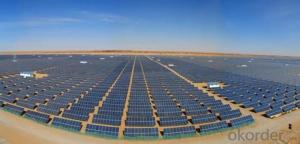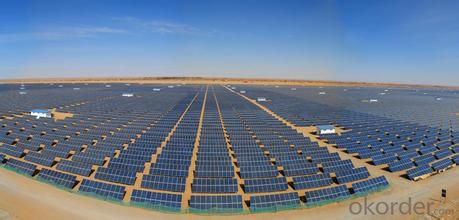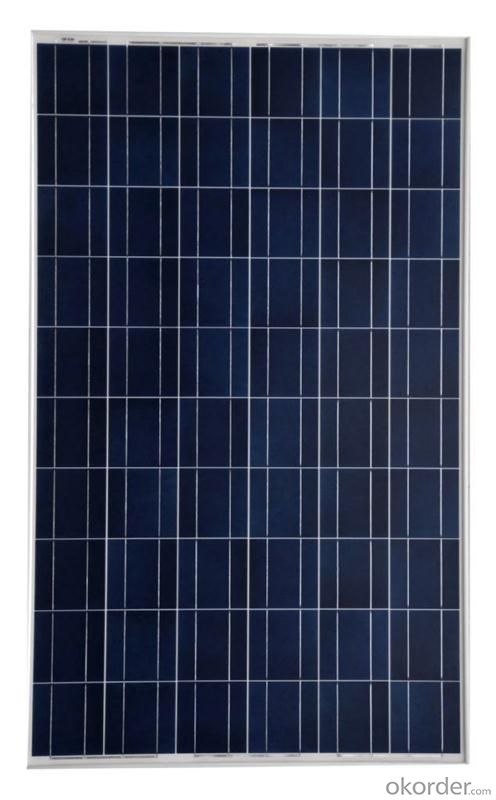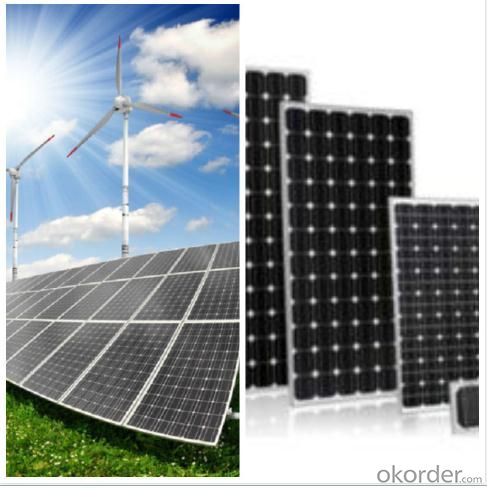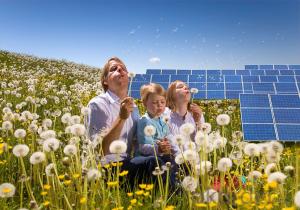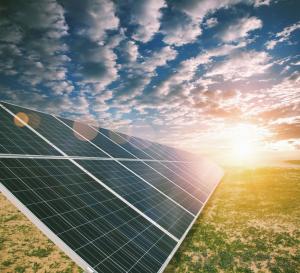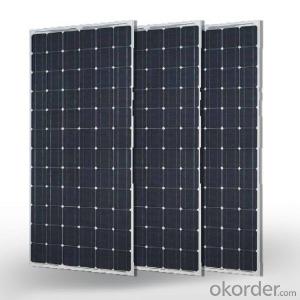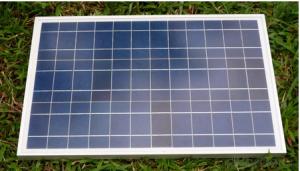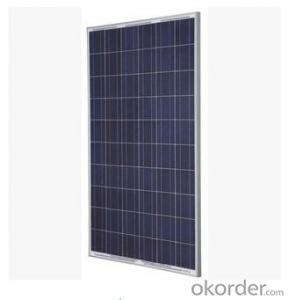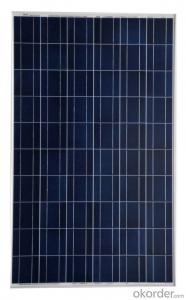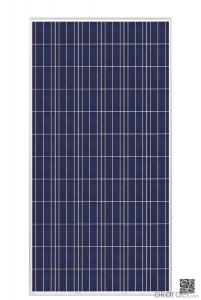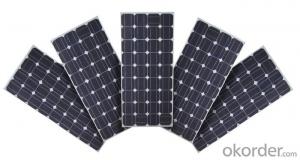Solar Panels Nm - 250w High Quality Solar Panel Module
- Loading Port:
- Shanghai
- Payment Terms:
- TT OR LC
- Min Order Qty:
- 2600 watt
- Supply Capability:
- 26000 watt/month
OKorder Service Pledge
OKorder Financial Service
You Might Also Like
Specification
Product Description:
1.Structure of Solar Module Description
Solar panel refers either to a solar hot water panel, a common type of a solar thermal collector, or to one or more solar photovoltaics (PV) modules, electrically connected and mounted on a supporting structure.
A PV module is a packaged, connected assembly of typically 6×10 solar cells. Solar PV panels constitute the solar array of a photovoltaic systemthat generates and supplies solar electricity in commercial and residential applications. Each module is rated by its DC output power under standard test conditions, and typically ranges from 100 to 320 watts. The efficiency of a module determines the area of a module given the same rated output – an 8% efficient 230 watt module will have twice the area of a 16% efficient 230 watt module. There are a few solar panels available that are exceeding 19% efficiency. A single solar module can produce only a limited amount of power; most installations contain multiple modules. A photovoltaic system typically includes a panel or an array of solar modules, an inverter, and sometimes a battery and/or solar tracker and interconnection wiring.
2.Main Features of the Solar Module
1).High conversion efficiencies resulting in superior power output performance.
2).Outstanding power output even in low light or high temperature conditions
3).Optimized design for ease of soldering and lamination
4).Long-term stability,reliability and performance
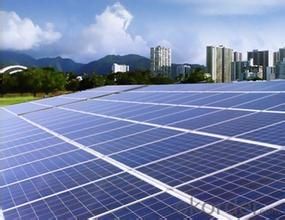
5.FAQ of Solar Module
1. Q: Do you have your own factory?
A: Yes, we have. Our factory located in Jiangyin city, jiangsu province.
2. Q: How can I visit your factory?
A: Before you take off from your country, please let us know. We will show you the way,or arrange time to pick you up if possible.
3. Q: Do you provide free sample?
A: Usually we do not offer free sample
4. Q: Could you print our company LOGO on the nameplate and package?
A: Yes, we can do that.
5. Q: Do you accept custom design on size?
A: Yes, if the size is reasonable.
- Q: My husband is interested in buying solar panels for the roof and i dont know where to find them.
- The okorder and read the to build or not to build article. Hope this helps. Dan
- Q: How do solar panels affect the property's energy resilience?
- Solar panels can significantly enhance a property's energy resilience by providing a reliable and sustainable source of electricity. They reduce dependence on the grid, allowing homeowners to generate their own power and potentially store excess energy in batteries. In the event of a power outage or grid failure, solar panels can continue to supply electricity, ensuring uninterrupted energy supply and boosting the property's overall energy resilience.
- Q: A few months ago my dad said something about getting solar panels, and how green they were. I was just wondering if there were any companies that sold them and if they would actually make a big difference.
- Not sure what application you need the panels for, but here is a website that retails a number of Solar products (as well as some other good alternative energy devices). Good luck!
- Q: I am told there are night vision goggles to see at night due to invisible light still hitting earth. I am also told that there are other beams, x-rays etc hitting earth.Why couldn't they invent a solar panel with dual power in the day?It could harness both visible and invisible light, and at night be single?Anyone know why they can't make an invisible light solar panel?Is this possible?What happens if future cars have night vision windshields instead of lights?
- They are actually working on building photovoltaic panels (Photovoltaic is actually the correct term for sunlight--electricity. Ordinary solar panels are those that use sunlight to heat water) that harness a larger range of wavelengths. From what I can gather the problem is either finding a material that absorbs more wavelengths, or finding a way to get multiple materials to coexist in a single panel. This situation will no doubt improve over time as new things like Nanotechnology give us the ability to create much more complex substances designed at the molecular level for light capture. Panels that can harness a wider range of the spectrum do exist, but the technology is in its infancy, and therefore expensive and not widely known. This isn't too surprising when you consider that Photovoltaic technology itself hasn't been in the mainstream all that long. I am a bit doubtful of photovoltaics that work at night, for the simple reason that at night there is less of *every* kind of energy falling on earth. Less visible light, infrared, etc. Infrared just happens to be particularly good at giving away hot objects, which is how Night Vision goggles work. For the same reason, a night vision windshield might be a very useful tool, but it would still have difficulty picking out colder objects, and those that reflected less infrared light. In other words, you might see cars and pedestrians, but you could easily miss the upcoming embankment 0.o .
- Q: Main questions: How can I work out the efficiency of a solar panel and how can I work out if the panel is relatively cost-effective? Also what type of solar panels is considered most effiecient?Let's assume that all relative values are available.Secondary question: What type of safety regulations and licenses are required to be fulfiled in order to import solar panels into the EU from non-EU countries?
- 366 W/square meter on March 2 and tweaked based on lattitude eff = W out/Sun W in there are special heat meters to measure W in ======== IEC 62688 Certification; and UL cert in USA
- Q: Can solar panels be used to power a construction site?
- Yes, solar panels can be used to power a construction site. By harnessing the sun's energy, solar panels can generate electricity that can be used to power various tools and equipment on the site, reducing the reliance on traditional power sources and lowering carbon emissions. Additionally, solar panels can be easily installed on temporary structures or mounted on portable frames, making them a viable and sustainable option for powering construction sites.
- Q: Our school is in the process of being built, but they have no plans to include any environmental benefits. I was wondering how to get a grant for solar panels (at least) or who I can talk to in order to get a grant.
- You might do better looking at a more economical environmental project. In most parts of the US, solar panels simply don't pay for themselves over their equipment life. Schools won't be eligible for tax credits (since they don't pay taxes) and so solar panels will likely take more than 40 years to pay for themselves. The life of a solar panel is expected to be 25 years. You should, however, try to talk to the school board about things like solar water heating (which can have a very attractive payback) and light fixtures that have sockets such that they will only take compact flourescent bulbs and skylights to allow for less lighting use in classrooms and perhaps even ground source heat pumps for space heating. All of these can be quite economical, and will make more sense when installed during construction. Good luck.
- Q: Mitsubishi Solar Panels For Home Installation: How Much Do The Panels Cost?
- Panels will cost in the range of 300-600 dollars for about 00 watts on average ( enough for one large lightbulb to run a few hours a day). The rest of the system needed will cost $2500-$4000. That is for the equipment. Cost for Installation?? Figure about 0 year life on equipment. It will probably never pay back investment, but will cut power usage. You can reduce power usage much more cost effectively buy simply conserving (Hot water temp. down, CFE bulbs, Better insulation, Better windows, Heat/Air a little colder/hotter, Attic ventilation, Geo Thermal heating/colling system). All of these measures will pay back sooner and save power usage. Solar will never pay back without major subsidies from the taxpayers. Particularly if in an area that has many cloudy days. Check it out. The calculations are basic and the facts are available if you really want them. Don't believe any salesmen or Environmentalists. They don't want you to know the facts.
- Q: What are the different types of solar panels?
- There are three main types of solar panels: monocrystalline, polycrystalline, and thin-film. Monocrystalline panels are made from a single crystal structure, offering high efficiency but also higher costs. Polycrystalline panels are made from multiple crystal structures, slightly less efficient but more cost-effective. Thin-film panels use a layer of semiconductor material, providing the lowest efficiency but the ability to be flexible and lightweight.
- Q: name things someone could use solar panels for or make with solar panels? (use solar energy i mean?)
- Solar panels can bee installed into your houses or apartments power box (if it's outside). But Solar panels cost more than $00 so i hope you saved up.
Send your message to us
Solar Panels Nm - 250w High Quality Solar Panel Module
- Loading Port:
- Shanghai
- Payment Terms:
- TT OR LC
- Min Order Qty:
- 2600 watt
- Supply Capability:
- 26000 watt/month
OKorder Service Pledge
OKorder Financial Service
Similar products
Hot products
Hot Searches
Related keywords
